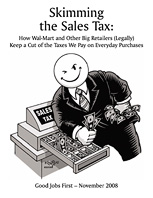Study Finds Out-of-Date Sales Tax Laws Provide Windfalls for Chains
According to a new study by the nonprofit research center Good Jobs First, little-known sales tax laws in 26 states that allow retailers to legally skim a percentage of sales tax revenue to pay for the administrative costs of collecting and remitting sales tax are providing big box retailers with an enormous advantage over their smaller competitors. The recently released report, Skimming the Sales Tax, also noted that these out-of-date sales tax laws are costing the public sector more than $1 billion a year.
 Philip Mattera, research director of Good Jobs First, who co-authored the study with Leigh McIlvaine, told BTW that laws compensating retailers for collecting and remitting sales tax were first passed in the 1930s. Back then, of course, without computers, store owners kept records by hand. Despite technological advances that have made sales tax collection much easier, these laws provide retailers in 26 states with compensation that is typically calculated as a percentage of the sales tax collected (and is limited to retailers who make their tax payments in a timely fashion), the study noted. With most of today's retailers calculating sales tax through computer programs, these laws are "providing a windfall for the big box retailer," Mattera said. "[The administrative] costs [of collecting sales tax] don't rise steadily as a store gets bigger and bigger. Retailers use software to collect it and send it out. Once a system is in place, the system is going to work."
Philip Mattera, research director of Good Jobs First, who co-authored the study with Leigh McIlvaine, told BTW that laws compensating retailers for collecting and remitting sales tax were first passed in the 1930s. Back then, of course, without computers, store owners kept records by hand. Despite technological advances that have made sales tax collection much easier, these laws provide retailers in 26 states with compensation that is typically calculated as a percentage of the sales tax collected (and is limited to retailers who make their tax payments in a timely fashion), the study noted. With most of today's retailers calculating sales tax through computer programs, these laws are "providing a windfall for the big box retailer," Mattera said. "[The administrative] costs [of collecting sales tax] don't rise steadily as a store gets bigger and bigger. Retailers use software to collect it and send it out. Once a system is in place, the system is going to work."
Of the 26 states, 13 put a cap on the amount an individual store or chain can receive. These ceilings range from $800 per year in New York to $240,000 per year in Michigan. The 13 states without a compensation cap "end up giving away substantial amounts of sales tax revenue in retailer compensation," the study says. "Illinois leads the list with an annual revenue loss of $126 million. Texas is second at $89 million, followed by Pennsylvania at $72 million and Colorado at $68 million." Combining states with caps and those without, Good Jobs First estimates that the 26 states lose a total of just over $1 billion per year.
Skimming the Sales Tax reports that the biggest benefactor of these laws is Walmart, which collects about $60 million a year in retailer compensation in the 26 states. Moreover, the study notes that Walmart and other big box stores have garnered millions in economic development subsidies, through such means as sales tax rebates and sales tax increment financing (STIF, where a portion of sales tax generated by a new retail project is diverted to subsidize the retailer or pay for infrastructure improvements). "Over the past decade Walmart projects have been given about $130 million in such subsidies, or an average of about $14 million a year," according to the study.
Said Mattera, "This is another way in which sales tax revenue is leaking out of the system.... A lot of local governments that do this are losing significant amounts of revenue."
Based on the study's findings, Good Jobs First is calling for states offering retailer compensation to modernize their practices in light of technological advances, and it's urging those states with no compensation ceilings to place caps. "Even if some amount of compensation is deemed appropriate, the economies of scale enabled by computerization remove much of the justification for limitless payments," Good Jobs First concludes. It is also recommending that local governments not subsidize retail projects, except in limited circumstances.
The states that provide vendor compensation with a cap are: Alabama, Arizona, Arkansas, Florida, Kentucky, Maryland, Michigan, Mississippi, Nebraska, New York, North Dakota, Oklahoma, and South Carolina.
The states that provide vendor compensation without a cap are: Colorado, Georgia, Illinois, Indiana, Louisiana, Missouri, Nevada, Ohio, Pennsylvania, Texas, Utah, Virginia, and Wisconsin.
The Skimming the Sales Tax report is available in its entirety at www.goodjobsfirst.org.